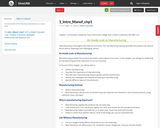
An examination of the Manufacturing Industry as a career field.
- Subject:
- Career and Technical Education
- Manufacturing
- Material Type:
- Lecture
- Date Added:
- 09/17/2019

An examination of the Manufacturing Industry as a career field.

Section: Process Selection & Just In Time and LeanFrom Lesson 2: Business Insights and CareersUnit 1: Material Properties and SelectionManufacturing Processes Course

Folder containing multiple files.

Section: Process Selection & Just In Time and LeanFrom Lesson 2: Business Insights and CareersUnit 1: Material Properties and SelectionManufacturing Processes Course

SMART INDUSTRIAL AUTOMATED SYSTEMS ENGINEERING TECHNOLOGY, BACHELOR OF APPLIED SCIENCESmart Industrial Automation Technology represents a multidisciplinary engineering field concerned with integrating, operating, modifying, and troubleshooting computer-based automated manufacturing system. These smart industrial automated systems typically contain a network of automated equipment, sensors, and other devices designed to make the system more intelligent, efficient, and reliable. The Smart Industrial Automated Systems Engineering Technology program prepares individuals to apply knowledge and technical skills to work in this field.
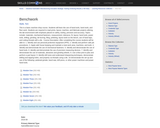
This is a basic machine shop course. Students will learn the use of hand tools, hand work, and floor work. Students are required to read prints,
layout, machine, and fabricate projects utilizing the lab environment with emphasis placed on safety, tooling, precision and accuracy. Topics include: materials, mechanical fasteners, measurement, tolerance, fit, layout, hand tools, power tools, drilling, grinding, de-burring,
filing, polishing, layout work on the bench, use of hand taps, and cutting threads with a die.
Course Description:
After completing this course students will be able to:
1. Identify and use personal protective equipment (PPE).
2. Identify and perform safe job procedures.
3. Apply safe house keeping and maintain a neat work area, machines, and tools.
4. Identify and demonstrate the use of mechanical fasteners.
5. Identify and demonstrate the use of hand tools.
6. Identify and demonstrate the use of precision measuring devices.
7. Identify and demonstrate the use of materials, abrasives and grinding wheels.
8. Use a blue print to plan and perform a part layout.
9. Identify drill sizes and understand sharpening techniques, demonstrate drilling and
tapping holes, and properly cut threads using a die.
10.Demonstrate the set up and use of the following: pedestal grinder, band saw, drill
press, or other power machines and power hand tools.

Career Gates: Manufacturing is a discussion by various employees of Rexroth, Just Born Candy, Coca-Cola and Martin Guitars or what their jobs and responsibilities are. Steve Morrow, General Manager of the Coca-Cola plant begins the tour, followed by Ross Born from Just Born Candy. Products highlighted are Just Born Peeps, Martin Guitars, and Coca-Cola sodas. The last section highlights what these employers look for when evaluating employees that will be hired.
WLVT PBS 39, The Lehigh Valley Workforce Investment Board and CareerLink Lehigh Valley have teamed to create these innovative video clips about various careers around the Lehigh Valley. The concept is to provide an awareness about upcoming businesses and career opportunities in the Lehigh Valley.

Learn about career opportunities in the plastics industry in this video segment adapted from Pennsylvania College of Technology and WVIA. Visit NPE: The International Plastics Showcase, the biggest plastics gathering in the world, and meet some people from the industry. Hear how different academic degrees can lead to different types of positions within the plastics industry. In addition, learn how emerging technologies such as recycling and bioplastics are a part of the sustainability and environmental movement.

OUTCOME: Learn about cast irons and the history, properties, application and commercial importance of cast irons.
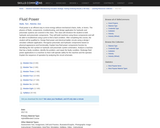
Fluid power is an efficient way to move energy without mechanical chains, bolts, or levers. The physics of fluids, components, troubleshooting, and design application for hydraulic and pneumatic systems are covered in this class. This class will introduce the student to both hydraulic and pneumatic components. They will build machines using these components and will be able to troubleshoot using a print to find a fault condition. After completing this course, the student will be qualified to: Design fluid power and electrical ladder circuits using a design / simulator software application. Recognize pneumatic and hydraulic components based on physical appearance and functionality. Explain how fluid power components function by identifying the ISO symbol on hydraulic and pneumatic system schematics. Analyze a machine that has a faulty condition, identify the problem, and repair the faulty condition. Redesign fluid power applications in a machine so that it will operate safely for the machine and the operator. Explain the sequence of operation by analyzing the circuit schematic.

Provides information about the physical and chemical properties of various types of materials and manufacturability of selected materials.
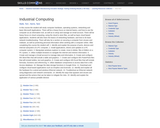
In this course the student will study computer hardware, operating systems, networking and basic Microsoft Applications. There will be a heavy focus on internet basics, and how to use the computer as an information tool, as well as to setup and manage an email account. There will be heavy focus on cloud computing, using the cloud to store files, as well as basic cloud based applications. Students will also learn the basics of networking hardware, and how to do basic network troubleshooting. There will also be a section on securing a computer from viruses and malware, as well as protecting personal information when working with a computer online. After completing this course the student will:
1. Identify and explain the purpose of ports, devices and internal subsystem of a PC computer.
2. Install applications, drivers and updates to a PC computer system.
3. Manipulate windows explorer to create, move & delete, files & folders on a PC system.
4. Utilize multiple browsers to navigate the internet and retrieve information.
5. Create and manage a Gmail account to manage data and information.
6. Create and configure MS Word files that will include a table and graphics.
7. Create and configure MS PowerPoint files that will include bullets, text and graphics.
8. Create and configure MS Excel files that will include formulas, functions and referencing.
9. Utilize database components to access data from a MS Access database.
10. Manage the data storage functions in Google Drive.
11. Download and configure cloud based applications such as Dropbox and Evernote.
12. Identify and explain all the hardware for a wired and wireless Ethernet network.
13. Troubleshoot an Ethernet network using diagnostics and network commands.
14. Identify the ways that spyware and viruses are spread and the actions that can be taken to mitigate the risks.
15. Identify and explain the application of various portable devices
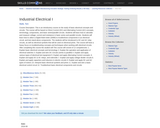
Course Description: This is an introductory course on the study of basic electrical concepts and circuits. The course will be based on Direct Current (DC) and Alternating Current (AC)
concepts, terminology, components, and basic series/parallel circuits. Students will learn how to calculate and measure voltage, current and resistance in basic series and parallel circuits. Students will learn how to utilize a Digital Multi-meter (DMM) to troubleshoot components in an electrical circuit, and test stand-alone components. The students will be introduced to DC and AC relay circuits, as well as electrical symbols that will be used on electrical prints. The course will have a heavy focus on troubleshooting concepts and techniques when working with electrical circuits.
After completing this course the student will
This course will consist of 12 competencies:
1. Explain basic electrical concepts and terminology
2. Explain the operation and application of electrical switches
3. Explain and wire DC Circuits (series & parallel)
4. Explain and apply various types of electrical test equipment
5. Explain and apply Alternating Current concepts.
6. Explain and apply DC & AC relays, and solenoids
7. Explain and apply voltage divider circuits
8. Explain and apply capacitors and inductors in electric circuits
9. Explain and apply DC and AC types of motors
10. Interpret basic electrical symbols and prints
11. Explain and wire a basic electrical control circuit
12. Troubleshoot basic electrical components and circuits
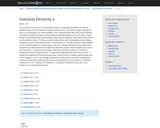
The purpose of this course is to develop the student’s knowledge and skills in the area of electrical safety, DC/AC machines and basic control circuits. The electrical safety module will focus on lockout/tagout, arc-flash standards, PPE, electrical panels and overcurrent protection. The DC/AC machines will focus on the wiring and troubleshooting of DC shunt motors, single phase motors (split-phase, capacitor-start, and permanent capacitor), dual voltage transformers, and three phase motors. The basic control circuits will consist of start/stop/jog, dual start/stop, sequence circuits, and reversing circuits. There will also be a module focused on the installation of a PLC system (based on the Micrologix 1200 PLC). Students will learn how to utilize a test equipment and electrical prints to troubleshoot electrical systems. After completing this course the student will:
1. Explain the NFPA Basic Safe Electrical Work Practices.
2. Install and troubleshoot DC/AC industrial motors
3. Install and troubleshoot electrical control circuits.
4. Install and troubleshoot forward/reversing motor control circuits
5. Explain industrial power and control voltages
6. Wire a dual voltage transformer for step-up and step-down configuration
7. Install and troubleshoot solid state discrete sensors (proximity & photo-electric)
8. Install and troubleshoot a PLC hardware I/O installation
9. Install and troubleshoot fuses and circuit breakers in an industrial environment
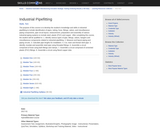
The purpose of this course is to develop the student’s knowledge and skills in industrial pipefitting to include identification of pipes, tubing, hose, fittings, valves, and miscellaneous piping components, pipe circuit layout, measurement, preparation and assembly of various industrial piping systems to include steel, plastic (PVC) and copper.
After completing this course, the student will be qualified to:
1. Identify various types of pipe, fittings, valves, hangers and miscellaneous components
related to industrial pipefitting.
2. Measure and layout piping and piping circuits.
3. Calculate pipe lengths for installation.
4. Cut, ream and thread steel pipe.
5. Identify, insulate and assemble steel pipe using threaded fittings.
6. Assemble a circuit comprised of hose using barb fittings and clamps.
7. Assemble a circuit comprised of cemented plastic (PVC) fittings.
8. Assemble a circuit using flared copper tube.
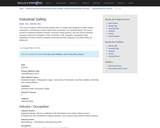
This course combines online learning modules with on-campus labs designed to enable student competency in performing common safety tasks performed in an industrial setting. The course focuses on potential workplace hazards, necessary safety practices, and how various industrial processes need to be managed in order to maintain a safe workplace. Appropriate safety regulations and laws, hazard recognition, personal protective equipment, and public safety are addressed.
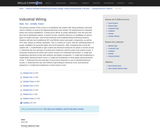
The primary purpose of this course is to familiarize the student with wiring methods commonly used in industry, as well as the National Electrical Code (Article 79) requirements for industrial power and control installations. A heavy focus will be on power
distribution, from the buss line (bus bar) to distribution panels, to branch circuits. Students will focus on installation of various types of conduit and wire, overcurrent protection and
troubleshooting of electrical systems. Students will wire and troubleshoot IEC and NEMA
control and power components, as well as VFD units, based on industry standards. This is a hands-on course, with the underlying theory of proper installation for personal safety and circuit protection. After completing this course the student will:
1. Install flexible & rigid conduit into electrical enclosures for power & control circuits.
2. Determine the size and type of conduit and conductors used for power and control circuits.
3. Terminate conductors for power and control circuits in an industrial environment.
4. Install and troubleshoot electrical circuits with switches and duplex receptacles.
5. Install and troubleshoot a single phase electrical branch circuit.
6. Install and troubleshoot a three phase electrical branch circuit.
7. Determine the size and type of overcurrent protection to use in industrial electrical circuits.
8. Determine the size and method of grounding an electrical circuit, and electrical equipment.
9. Install and troubleshoot a motor branch circuit

Lorain County Community College (LCCC) is partnering with FANUC, IST and Rockwell Automation to provide cutting-edge industrial robotic connections and curriculum. LCCC provides Industry 4.0 training in Automation and Robotics for educators who want to deliver I4.0 technologies training in the classroom, preparing your students for pathways into exciting Automation and Robotics careers. This program includes: hands-on, industry-relevant projects, industry recognized credentials, capstone course, and an externship with a manufacturer.
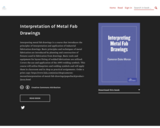
Interpreting metal fab drawings is a course that introduces the principles of interpretation and application of industrial fabrication drawings. Basic principles and techniques of metal fabrication are introduced by planning and construction of fixtures used in fabrication from drawings. Basic tools and equipment for layout fitting of welded fabrications are utilized. Covers the use and application of the AWS welding symbols. This course will utilize blueprints and welding symbols and will apply them in classroom and in shop as practical assignments.

Manufacturing is the engine that fuels our economy. The manufacturing industry provides the products we need to live as well as rewarding and challenging careers,